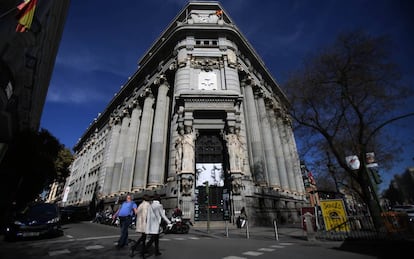America claims its stake in the Spanish language
Spain¡¯s plan to include language promotion in Marca Espa?a angers Hispanic academies


The first announcement was made on January 24 by Spain¡¯s own prime minister, Mariano Rajoy, at the Reina Sof¨ªa Museum in Madrid, where he spelled out one of his government¡¯s new priorities: promoting Spanish as a global language.
And last week, Culture Minister ??igo M¨¦ndez de Vigo unveiled further details in Congress: The year 2019 will be declared the Year of the Spanish Language. The initiative will be part of Marca Espa?a (Spain Brand).¡±
This is not about rivalries, it is about a sense of belonging to a common language Carmen Mill¨¢n, director of the Caro y Cuervo Institute in Colombia
The Marca Espa?a website notes that there are over 570 million Spanish speakers in the world, making the language ¡°a global agent that produces wealth, identity, culture and brand. But it still has great opportunities for expansion and development in the digital era. It is expected that in 30 years there will be over 700 million Spanish speakers.¡±
But both announcements have aroused discontent in Latin American linguistic circles, where the statements are being viewed as a snub to the rest of the world¡¯s Spanish-speaking countries, their own language academies, and the global nature of the language.
Language advocacy agencies in the Americas worry that the plan undermines a pan-Hispanic strategy to defend Spanish, built on two decades of cultural diplomacy aimed at channeling everyone¡¯s efforts. V¨ªctor Garc¨ªa de la Concha encouraged this concerted effort by Spanish-speaking countries while he headed the Spanish Royal Academy (RAE), between 1998 and 2010.
Spain¡¯s own political groups in Congress, save for the governing Popular Party (PP), have also disparaged the proposal. The most vocal criticism has come from Ciudadanos, which sees the initiative as devoid of content. Meanwhile, Basque and Catalan nationalists view it as a personal attack on their own languages; the anti-establishment Podemos considers it too focused on narrow economic benefits; and the Socialist Party (PSOE) has issues with the proposal¡¯s budget.
Ever since the 1990s, linguistic policies and norms ¨C including the content of dictionaries, grammar books and spelling guides ¨C have enjoyed a broad consensus. This was made possible through cooperation between the RAE and the Association of Spanish Academies (ASALE), which represents 23 countries and is headquartered in Madrid.
What is the plan?
The Marca Espa?a website details some of the initiatives that will be part of the new Spanish language promotion project. These include creating an ¡°Ibero-American Erasmus¡± study grant to stimulate university student exchanges, appointing ¡°Spanish language ambassadors¡± among global celebrities, and designing a digital platform in Spanish and Portuguese to offer free content in the fields of literature, film, music, art, science. The program will also encourage the creation of digital services and apps in the Spanish language.
These groups, together with the Cervantes Institute, organize international congresses that bring together language experts to debate issues of concern and discuss progress.
Culture Minister M¨¦ndez de Vigo is not unaware of these policies. Before putting his plan to Congress, he was alerted to the fact that it would not go down well outside Spain by the directors of the RAE and the Cervantes Institute, Dar¨ªo Villanueva and Juan Manuel Bonet. A high-ranking official at the Foreign Ministry, which oversees the Cervantes, did the same. The minister listened, but went ahead with the plan anyway.
Sources at the ministry told this newspaper that they are not aware of any unrest caused by the Marca Espa?a plan, and declined to make any further comments. Neither Villanueva nor Bonet were available for comment, either.
Jos¨¦ Antonio Pascual, the director of the New Historic Dictionary of Language, considers the initiative ¡°a marketing operation. And marketing operations are good if they come with money,¡± he added.
Francisco Javier P¨¦rez, the Venezuelan secretary general of ASALE, said he strongly opposes the plan.
The minister for Culture was warned the policy would not go down well outside Spain but pushed ahead anyway
¡°Although I cannot speculate about the motives that led to this conceptualization of the language within the Spain Brand, I feel that it was a mistake to do it the way it¡¯s been done. I would propose that they rectify at a strictly linguistic level, and talk instead about a Pan-Hispanic Brand shared by the 23 nations or territories where Spanish is spoken.¡±
Marca Espa?a defines itself on its own website as ¡°a long-term state policy aimed at improving the country¡¯s image abroad and among Spaniards themselves.¡± Its chief is High Commissioner Carlos Espinosa de los Monteros, who answers to the Foreign Ministry and the Prime Minister¡¯s Office.
P¨¦rez said that the apparent desire by Spain to recentralize control over the common language is ¡°at the very least worrisome.¡± And associates, including the RAE, ¡°cannot look favorably upon this return to the past.¡±
Other sources said that the Spanish government is not fully aware of what the pan-Hispanic policies have contributed to the language promotion effort.
Jos¨¦ Luis Moure, president of the Spanish language academy in Argentina, also expressed disapproval.
There are over 570 million Spanish speakers in the world
¡°Nobody should question the good intentions behind the project, but it seems unfortunate to say the least to integrate the common language into the Spain Brand without first considering that 22 nations, whose speakers are an overwhelming majority and active shareholders in a society of equals, have not been given a chance to participate in this construction.¡±
In Mexico and Colombia, teaching and expanding the use of Spanish is considered a state policy. The National Autonomous University of Mexico (UNAM), one of the biggest institutions of higher learning in the world, has led linguistic alliances with Spain through the Cervantes Institute, including an international language evaluation certificate currently in use, known as the Siele.
¡°We are a pan-Hispanic society that has a place in modernity,¡± said Andr¨¦s Ord¨®?ez, a UNAM representative in Madrid who said he was speaking on a personal level. ¡°Our association with Spanish institutions favors a sense of integration for our common policies.¡±
Carmen Mill¨¢n, director of the Caro y Cuervo Institute in Colombia, agrees: ¡°In our country, 48 million people speak Spanish,¡± she says. ¡°Although our numbers are not comparable to Mexico¡¯s [120 million speakers], they surpass Spain¡¯s [47 million]. But this is not about rivalries, it is about a sense of belonging to a common language.¡±
English version by Susana Urra.
Tu suscripci¨®n se est¨¢ usando en otro dispositivo
?Quieres a?adir otro usuario a tu suscripci¨®n?
Si contin¨²as leyendo en este dispositivo, no se podr¨¢ leer en el otro.
FlechaTu suscripci¨®n se est¨¢ usando en otro dispositivo y solo puedes acceder a EL PA?S desde un dispositivo a la vez.
Si quieres compartir tu cuenta, cambia tu suscripci¨®n a la modalidad Premium, as¨ª podr¨¢s a?adir otro usuario. Cada uno acceder¨¢ con su propia cuenta de email, lo que os permitir¨¢ personalizar vuestra experiencia en EL PA?S.
?Tienes una suscripci¨®n de empresa? Accede aqu¨ª para contratar m¨¢s cuentas.
En el caso de no saber qui¨¦n est¨¢ usando tu cuenta, te recomendamos cambiar tu contrase?a aqu¨ª.
Si decides continuar compartiendo tu cuenta, este mensaje se mostrar¨¢ en tu dispositivo y en el de la otra persona que est¨¢ usando tu cuenta de forma indefinida, afectando a tu experiencia de lectura. Puedes consultar aqu¨ª los t¨¦rminos y condiciones de la suscripci¨®n digital.
More information










































